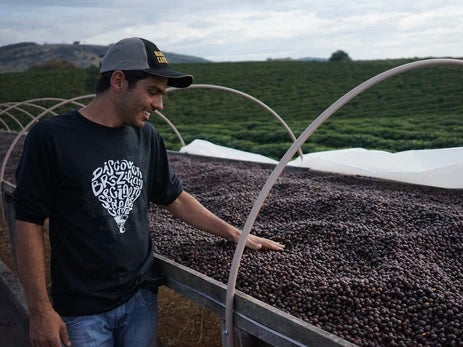
CAPADOCIA / BRAZIL
CAPADOCIA / BRAZIL
Origin: Brazil
Producer: Augusto Borges Ferreira
Farm: Capadocia
Region: Sul de Minas > Sao Goncalo do Sapucai
Altitude: 1300 masl
Harvest: 2022
< Filter Roast >
→ Purchase here
Flavor Profile:
Tropical fruits, Caramelized walnut, Creamy mouthfeel.
Varieties: Catuai, Mundo Novo
Process: Extended Fermentation Natural
<Espresso Roast>
→ Click here to purchase
Flavor Profile:
Dried prune, Orange aroma, Walnut notes.
Varietal: Catucai
Process: Natural
After visiting Capadocia Farm in 2018, we have been sourcing their coffee every year since 2021.
*Check out the article on the 2018 Origin Trip - Brazil - here.
The coffee produced by Augusto and his wife Patricia may not have an overpowering fruitiness, but it possesses a strong fruitiness that challenges the general perception of Brazilian coffee.
We procure both Espresso Roast and Filter Roast coffee beans from their farm every year. We believe that from either of these roasts, you can experience the exceptional quality of coffee they produce.

Augusto was born into a fourth-generation coffee-producing family and grew up among coffee trees. His dedicated focus on producing high-quality coffee began in 2008. His wife, Patricia Fernanda Silveira, also comes from a lineage of coffee farming. They both share a strong commitment to quality improvement in coffee cultivation, and they are bound by a strong family-like bond fueled by their ambition.
Their farm, named Capadocia, is situated in the southern part of Minas Gerais state in Brazil. The region of Sul de Minas is widely recognized for coffee production and accounts for about 30% of Brazil's coffee output. The mountainous terrain of Sul de Minas provides an ideal environment for coffee cultivation, with fertile soil and stable temperatures ranging between 22 to 24 degrees Celsius. Augusto believes that the maturation of cherries is a crucial factor in producing high-quality coffee.

Brazil is the world's largest coffee-producing country. In comparison to coffees from other origins, Brazilian coffee is often associated with a stable and affordable quality, evoking flavors reminiscent of milk chocolate and nuts. The traditional profile with mild fruitiness doesn't often fetch high prices in the current market. As a result, Brazilian coffees are often traded in the relatively lower price range within the specialty coffee market, which makes it challenging for producers to acquire the funds needed for quality improvement or new initiatives. In other words, without securing a market for higher-priced coffee, producers struggle to invest in quality.
The production costs in Brazil are higher than the market prices, which forces producers to manage their production with cost-efficiency in mind. Labor costs, in particular, constitute a significant portion of the production expenses, leading many Brazilian farms to employ large-scale mechanical harvesting methods. On the other hand, Augusto's farm employs exclusively manual cherry harvesting. While manual harvesting incurs an average cost three times that of machine harvesting, the discernible difference in the quality of the resulting coffee is evident.
You can strongly sense his belief that "Brazilian coffee should strive for specialty grade" through his coffee.




